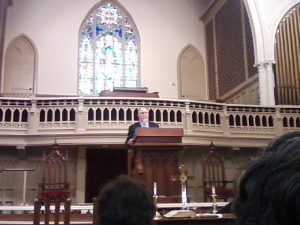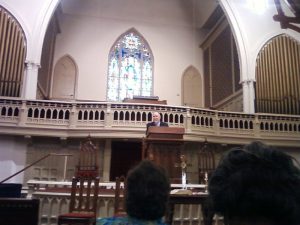This article is more than 5 years old.
On June 7th and 8th, I attended the annual conference of the Baptist History and Heritage Society, which was held in Raleigh this year. The BHHS ” a 73-year old non-profit, professional organization with members worldwide, bridges the worlds of the academy and the congregation, communicating the story of Baptists through print and digital media publications, conferences and seminars”. I was familiar with this group because many of the books they publish are wonderful resources that we add to the NC Baptist Collection, and we receive their journal Baptist History and Heritage, which is also part of the NC Baptist Collection. But I had not been to a conference before…
This year, the stars aligned just right to make this a great time for me to attend. The conference was in Raleigh, hosted at First Baptist Church Raleigh, and it would be a perfect opportunity for me to share information about our Biblical Recorder Digitization Project. I hoped that it would be possible for me to have a poster on display along with some take-along cards that have the website for the BR project as well as the Special Collections email address, phone and website. I contacted the Executive Director of the society and asked him about my idea. He said that would be fine, but he also wanted to find some time for me to present the information to the attendees. Even though most of the program was already scheduled, they found a slot for me to speak briefly on Thursday night. I told about how the digitization project came about through an IMLS grant, and about the processes we went through to finally wind up with the finished product. My presentation tied in nicely as the intro for the main speaker that night, Dr. Glenn Jonas of Campbell University. Dr. Jonas has written a book about the history of the First Baptist Church of Raleigh which is celebrating its 200th anniversary and used the Biblical Recorder for a lot of his research. He said he just wished it had been online and searchable earlier! He spoke about his research and how fortunate he was that FBC Raleigh had kept such detailed and organized records. He then told of how FBC Raleigh had been very progressive all along in regards to having black members as well as female deacons all in the 1800’s.


( A side note of interest: the name “Charles Lee Smith” appears at the bottom of the stained glass window behind Dr. Jonas. He was a member of FBC Raleigh, and donated his library to Wake Forest College in 1941. His books was the core of what is now the Rare Books collection here at ZSR!)
After the presentations were finished, several people came up to ask me about various aspects of our project. They said that they had heard about it and were very excited to use it! Wake Forest’s own Bill Leonard was there, too, and said he was very glad that I was spreading the word about the BR and he had also used it. BHHS director, Bruce Gourley, asked if we have plans to do more digitization of other Baptist materials, and complemented the BR site which he had already used to research for his blog, Baptists and the American Civil War. It was so good to hear such positive feedback, and know that it is such an appreciated resource.
The next day, I attended several sessions and heard paper presentations on interesting topics in Baptist history.
*Deane Langdon told about Alma May Scarborough who wrote church materials for children and was a proponent of teaching children through play rather than lecture. She trained hundreds of teachers across the country and helped to bring about change in the way children’s Sunday School classes were taught.
*Steve Lemke from New Orleans Baptist Theological Seminary presented research on theological perspectives in hymnody, showing how Baptist theology is expressed in hymns and relating how this theology has been tested over the centuries in three major “Worship Wars”. The first was in the 16th century and dealt with sacred spaces and how Baptists “did worship”. The language of hymns, the tunes, and the use of musical instruments were all points of contention for those who were establishing new patterns of Reformation worship. Worship War II was in the 17th and 18th centuries. During this time, hymns became more personal and evangelical. But some groups of Baptists did not like congregational singing, and this is still a trait of Primitive Baptist churches today. Others didn’t like the personal wording and theology of the “new hymns” and this led to a split of many congregations. Worship War III is happening today, with issues such as the use of “praise choruses”, the theology that is focused on in traditional versus contemporary hymns and how a congregation can find its most suitable style of worship and hymns based on its theology.
*Jay Smith from Yellowstone Theological Institute ( a new school in Montana) spoke about new ways of “doing and being church” (he quoted Bill Leonard on that). He addressed the fact that there are many ways to be a Baptist theologically and that many pastors and congregations today are trying to embrace a post-modern era.
*Philip Thompson fro Sioux Falls Seminary in South Dakota talked about how Baptist history and identity have been argued about for years, and that Baptist principles can’t be separated from Baptist history. He quoted Nathan Hatch as saying “we are in an age of radical anti-elitism” and how this attitude shows up in many congregations across the country.
In addition to hearing informative speakers, I was able to meet other archivists and librarians who work with state Baptist collections in Georgia, Alabama and Texas. It was great to make those connections and compare notes. One even said “we were talking about your Biblical Recorder project the other day, and would like to do something similar to that”! Great to hear that our work has been noticed. I’m glad I had the chance to attend this conference and meet people who maintain similar kinds of collections as well as those who research heavily in our collections and appreciate our materials on a different level than a casual user. I hope to attend again next year!
5 Comments on ‘Vicki at 2012 Baptist History and Heritage Conference’
This is an excellent report, Vicki, thank you for writing it up. It is wonderful to hear that people are using the Biblical Recorder online!
Vicki, it was great to meet you, and I am so appreciative of your efforts to make Baptist history more accessible to the public via digitization. If you have an email newsletter, please put me on the list!
Good report, Vicki. It sounds like you did a great job of representing ZSR’s Special Collections and the digitization projects. I’m glad that you got a chance to present.
Great job, Vicki. It really is fabtastic that people are using the Biblical Recorder!
Love the report and positive reception for the BR project! It’s great that there were several WFU shout-outs as well!